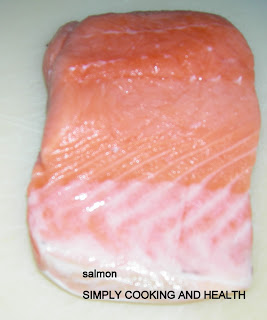 |
| Salmon |
Salmon is considered a healthy food because of its amazing amount of omega-3 fatty acids, protein and high Vitamin D content, . Omega-3 is good for heart and brain health. It is called 'essential fatty acid' because our body cannot make it. Apart from Omega-3 fatty acids, salmon provides vitamins and minerals (including potassium, selenium and vitamin B12). Other health benefits include:
Helping to maintain insulin level in the
body;
Improving memory and brain functions;
Helping in preventing muscular
degeneration;
Reducing the risk of colon, kidney and
prostrate cancers;
Helping in maintaining healthy hair and
skin;
Helping in osteoarthritis and other
inflammatory joint conditions;
Reducing depression;
Tryptophan present in salmon helps to
sleep well;
Complete nutrition content of salmon is
found here in the USDA database,
Salmon is also a source of
cholesterol, with a range of 23–214 mg/100 g depending on the
species.
According to reports in the journal
"Science", farmed salmon may contain high levels of
dioxins. PCB (polychlorinated biphenyl) levels may be up to eight
times higher in farmed salmon than in wild salmon, but still well
below levels considered dangerous. According to a study published in
the Journal of the American Medical Association 2006, eating even
farmed salmon is beneficial as its benefits outweigh risks imposed by
contaminants. Farmed salmon is shown to have a high omega 3 fatty
acid content compared to wild salmon.
Consuming two servings of 150 grams per
week is considered adequate for a person. If you consume more than
this quantity then try other varieties of fish to get different
nutritional benefits of other types of fish. .
Almost 99% of the Atlantic Salmon is
farmed while 80% of the Pacific salmon is caught in the wild.
Fish farmers often feed their stock
with soy and corn, both are heavily genetically modified crops.
Therefore farmed salmon is not as good as wild-caught fish. Some
farmers also feed their salmon with pink die so that their flesh will
look like the wild-caught fish.
Salmon has a long history. It has long
been at the heart of the culture and livelihood of coastal dwellers.
It has been mentioned in several mythologies. In Celtic mythology,
"The Boyhood Deeds of Fionn", the Salmon will grant powers
of knowledge to whoever eats it. In Welsh mythology, "Culhwch
and Olwen", King Arthur's men Cai and Bedwyr are led to the
Salmon of Llyn Llyw, who lets them ride its back to the walls of
Mabon's prison in Gloucester.
In Norse mythology, after Loki tricked
the blind god Höðr into killing his brother Baldr, Loki jumped into
a river and transformed himself into a salmon to escape punishment
from the other gods. When they held out a net to trap him he
attempted to leap over it but was caught by Thor who grabbed him by
the tail with his hand, and this is why the salmon's tail is tapered.
Large fish consume smaller fish and
therefore accumulate higher levels of mercury. This process is called
biomagnification. Species such as shark, tuna, tilefish and swordfish
have high levels of mercury and are best to be avoided completely.
Salmon are very low in mercury as they are small in size and eat only
plants.
No comments:
Post a Comment